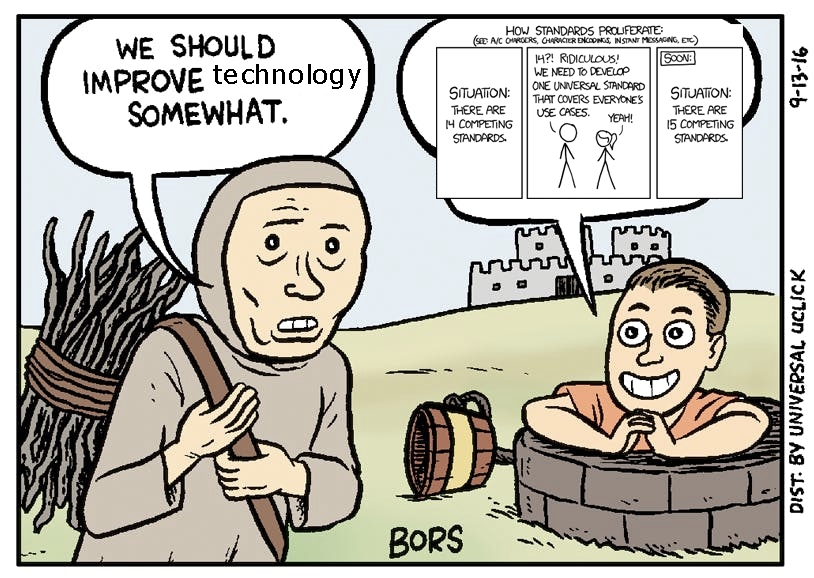
There are many, I think. Like what other people have mentioned, sometimes the new standard is just better on all metrics.
Another common example is when someone creates something as a passion project, rather than expecting it to get used widely. It’s especially frustrating for me when I see people denigrate projects like those, criticizing it for a lack of practicality…
I was surprised to find that there are a ton of symbols that have sought to become the standard notation of sarcasm in text. I think we should really adopt one of those that are far more elegant than the “/s.” /s Looks ugly as fuck.
i like /s
I’m going to assume that is sarcastic.
no (yes), i prefer no sarcasm marker ideally, but if you have to, i prefer /s over some others (i dont like /jk or lol). If you can’t tell sarcasm from not sarcasm, you really should not be using internet.
Poe’s law friend. There are people who honestly believe the earth is flat. There is an elected government official who has made public claims about Jewish Space Lasers.
We live in the dumbest timeline, no matter how stupid or insane a comment is there is someone who legitimately believes it.
Whenever the new standard hits the almost impossible golden triangle of “cheap, reliable, and fast”.
It’s gotta be cheaper than the alternatives, better and more reliable than the alternatives, and faster/easier to adopt than the alternatives.
Early computers for example had various ways to chug math, such as mechanical setups, relays, vacuum tube’s, etc.
When Bell invented their MOSFET transistor and figured out how to scale production, all those previous methods became obsolete for computers because transistors were now cheaper, more reliable, and faster to adopt than their predecessors.
Tbf though transistors are more of a hardware thing. A better example of a standard would be RIP being superceded by BGP on the internet.
UEFI boot mode
Small net protocols like Gemini, gopher, spartan, IPFS because they don’t compete with the web instead they coexist as separate things.
There are a lot and in most cases you’ll notice when dealing with Americans, who are refusing to do stuff like the rest of the world. The meter and kilogram took over from hundreds of different measurement standards. Most of the world is using the same calendar and writes dates in the same way. Most countries are driving on the same side. Traffic signs are kind of the same worldwide. You can buy screws with the same standard everywhere.
what if instead of coming up with new standards to the pile you combine existing ones, based on what works and is reasonable to do?
Not exactly this, but it reminds me of my first job. I used to work in finance, and I was given the task of automating cash flow reports that were sent out to hundreds of clients.
The problem was that they were made manually in Excel, and most of them were unique. So every couple years they’d get a bunch of smart people in a conference room, and tell them to figure out how to automate the cash flows. The first step was always to create a standard cash flow template, and convince everyone to adopt it.
Some users would adopt the new template, but most of them would say that the client didn’t like it, so they’d stop using it and the project would fall apart.
By the time I got there, there were still hundreds of unique cash flows, but then there were a few dozen that shared the same handful of templates, like a graveyard of failed attempts to automate this process.
I just made the output customizable. The reports looked the same as what the client was used to, but it saved hundreds of man hours for the users. A lot of people got laid off.
Networking standards started picking winners during the PC revolution of the 80’s and 90’s. Ethernet, with the first standards announced in 1983, ended up beating out pretty much other LAN standard at the physical layer (physical plugs, voltages and other ways of indicating signals) and the data link layer (the structure of a MAC address or an Ethernet frame). And this series of standards been improved many times over, with meta standards about how to deal with so many generations of standards through autonegotiation and backwards compatibility.
We generally expect Ethernet to just work, at the highest speeds the hardware is capable of supporting.
emacs is everything
Except fast.
It just needs a good text editor, is all.
When the standard is a big interoperability push that leverages MORE functionality as a bribe to be implemented.
This is how USB (plug & play!), Bluetooth (wireless headset!), HDMI (high def, single cable!) , and USB-C (both sides are good!) all beat the entrenched pseudo standards.
The way I see it, it’s not so much an issue of making something that’s better than the other standards. It’s really about getting your standard into actual use and hitting critical mass which makes all the other standards irrelevant.
see also: NACS (yep that’s a Tesla plug in a standards agreement)
Yeah. No standard covers all use cases. It’s just best to have one standard that makes a lot of compromises.
Email, as far as im aware there isn’t some alternative email standard (messaging services, whatsapp, signal, sms, etc do not count imo as I believe they serve a different purpose than email)
DNS, while there are alternative root servers, they still fundamentally rely on the dns protocol.
TCP/IP, when the internet was first starting, this was not the only standard in use, but now it is (to my knowledge).
I thought about this for longer than I should’ve for a comment on a random post, but this is all I could think of lol.
edit: grammar
TCP/IP isnt the only standard in use even today. UDP/IP is the other big one and there’s a few smaller protocols hanging around like utp.
TCP/IP is not the same as TCP, and UDP/IP doesn’t exist
Wat.
Lol. Dont waste peoples time in the future thanks!
You’re saying I’m wrong?
Ah, I shouldve been more clear. I didnt just mean tcp specifically, I meant IP as a whole, for an example of a competing standard see x.25.
Funny enough, that wikipedia article mentions that x.25 is still in use by the aviation industry, and after a quick search it seems it is! So I guess Im still wrong lol.
You can probably throw Ethernet in there as well then, unless there’s anyone out there rocking a Lemmy instance on token ring…
I remember token ring settings in our family Mac in the early 90s. We eventually got broadband and my carpenter dad wired the house for Ethernet in around 98. He was cool dad at the time and way more tech savvy than anyone expected.
Ipv4 vs ipv6 🫠
fair enough!
We also have I2P now.
!! i was not aware of I2P. what a wonderful network.
that’s a different layer, it’s not transport but a network protocol. it “competes” with IP
Dont think we need to make that distinction here. :) correct of course but ip vs i2p, tcp vs udp vs utp, etc are all different layers of the same domain.
Chess, there’s so many wonderful ways to play.
Also, playing cards. Every casino and basement house party uses the same 52 card deck. It’s sold in airports all over the world.












